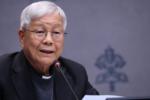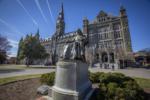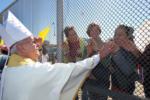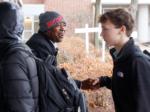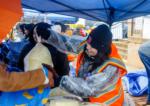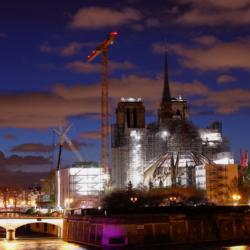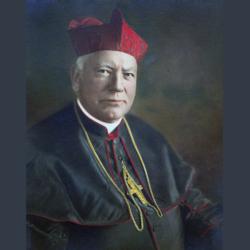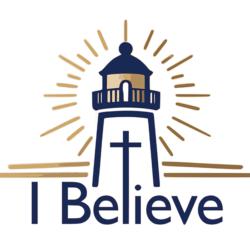Priestly fraternity celebrated at annual Chrism Mass
BOSTON -- Whenever he visits St. Peter's Basilica in Rome, Cardinal Seán P. O'Malley says he always discovers something new.
The last time Cardinal O'Malley visited St. Peter's, he saw a mosaic in front of the sacristy depicting the story of Ananias and Sapphira. In the Acts of the Apostles, Ananias and Sapphira were a couple who sold their land and promised God that they would give the money to the poor but kept some of it for themselves. As punishment for lying to God, the two were stricken dead. The mosaic was made as a reminder for priests to keep the promises they made to God when they were ordained.
Cardinal O'Malley described the mosaic and its message to the hundreds of priests who came to renew their priestly promises at the Chrism Mass, which the cardinal celebrated in the Cathedral of the Holy Cross in Boston on March 26. The Chrism Mass, celebrated annually on the Tuesday of Holy Week, is when the archbishop blesses three types of sacramental oil: The oil of the catechumens, which is used for baptisms; the oil of the infirm, which anoints the sick; and the sacred chrism, which is used for baptisms, confirmations, ordinations, and the dedication of churches and altars. After the blessing, the oils are then distributed among the parishes and religious communities of the archdiocese for use throughout the year.
"The fact that we all use the same oils, blessed at the same Mass, is a striking sign of the unity of our ministry," Cardinal O'Malley said in his homily.
The Chrism Mass is also a time for the archdiocese's priests to gather and celebrate their brotherhood. In a long-standing gesture of ecumenical fraternity, Metropolitan Methodios, the Greek Orthodox Metropolitan of Boston, was invited once again to be a special guest at the Chrism Mass.
Introducing Metropolitan Methodios, Cardinal O'Malley noted that 2025 marks the 1700th anniversary of the Council of Nicaea. To mark the occasion, Pope Francis plans to spend the year promoting unity between the Catholic and Orthodox Churches, including the possibility of establishing a common date for Easter. Cardinal O'Malley joked that if that happens, he will miss celebrating Easter twice a year, as he customarily joins the Metropolitan and the Orthodox community for their celebration of Easter.
In his remarks to the assembly, Metropolitan Methodios thanked Cardinal O'Malley and the archdiocese's bishops and priests for their warm welcome.
"Easter is not a date that we celebrate once or twice," he said. "What it should be is a celebration every day of our lives, and that we capture the risen Lord and offer him an abode in our hearts."
Metropolitan Methodios hoped that God would grant a long life to Cardinal O'Malley, whom he called his "brother."
"We need you to stay in this archdiocese to continue your visionary faith," Metropolitan Methodios said, "your visionary leadership, of not only the Catholic community, but the entire Christian community here in Boston and throughout New England."
He also wished all those in attendance a happy Easter.
During the Chrism Mass, the Archdiocese of Boston's priests renew their priestly promises. Led by Cardinal O'Malley, the priests renewed their vows of humble service to God. The cardinal then told the assembly to pray for their priests, living and deceased. The names of priests who had died in the past year were also read.
In his homily, Cardinal O'Malley recalled the first time he celebrated a Chrism Mass when he was Bishop of the Virgin Islands. At first, it was celebrated on Holy Thursday, and only a few priests and parishioners were in attendance. The next year, he moved the date of the Mass to the Tuesday of Holy Week, and thousands of people attended.
"I immediately fell in love with this liturgy for so many reasons," he said. "First of all, it calls for us priests to be together and to renew our priestly promises."
The cardinal called the Chrism Mass a "spiritual tune-up," which gives priests the chance to reflect on their ministry and its obligations. He thanked the Archdiocese of Boston's priests for making the sacrifice of choosing the priesthood over marriage, family, a secular career, and a private life. Instead, he said, they chose to serve as spiritual leaders, anointing their parishioners with "the oil of gladness" in times of grief and suffering.
"We thank you for that smile that conceals the pains and disappointments inherent in a life of ministry," Cardinal O'Malley said.
The cardinal spent much of his homily emphasizing the necessity of constant, sincere prayer in priests' lives. When that prayer is missing, he said, the chrism oil loses its power.
"Without prayer," he said, "ministry can become powerless, theater, going through the motions, punching in the clock."
He described prayer as taking many forms -- private or in a large group, joyful or sorrowful, in light or darkness, loud or silent. Sometimes, he said, it is in "deafening silence" that God's presence is truly felt.
"In prayer," he said, "we find the joy of a simple lifestyle free from the dictates of the consumer society. Through prayer, obedience can become a joy, to follow Jesus, the freest man who ever walked the earth, and who is obedient unto death."
He also called on Catholics to connect themselves to God not simply during prayer but in every aspect of their lives.
"We must never lose sight of the mysterious presence of God in the poor, in the sick, in the suffering," he said. "If our prayer is genuine, it will make us kinder, more gentle, more patient, more trusting. All genuine prayer leads us to love God and love our neighbor."
Cardinal O'Malley also emphasized the importance of the Bible in the life of a priest. He noted that, during the theological debates of the Protestant Reformation, Protestants pointed to Scripture while Catholics pointed to sacraments. The cardinal said that Scripture and sacraments must be connected.
"Jesus astonishes the people because he speaks with authority," he said. "The Word of God is the power to cast out evil spirits, to forgive sinners, to heal and restore life."
He told the priests that the reading of Scripture is not merely an academic exercise or preparation for giving a homily but an act of spiritual renewal.
"Someone once said that we don't work on the Bible," he said. "It's the Bible that works on us."




